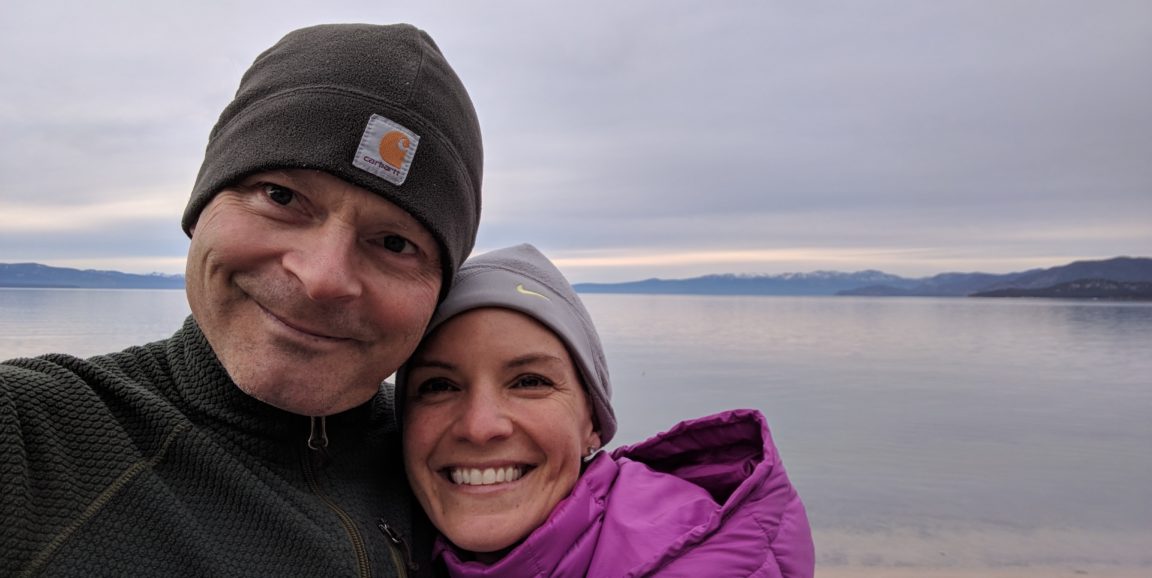First dates run the gamut -- they can be anything from magical to downright devastating. For Andrea "Andi" Traynor, MD, a clinical associate professor at Stanford Medicine, and Max Montgomery, their first official date was magical and devastating all at once.
A shared love for stand-up paddleboarding and an interest in helping people with special needs brought Traynor and Montgomery together.
Traynor is a single mother with two children ages 10 and 13. One of her children has autism and a few years ago, they started stand-up paddleboarding and surfing together as a fun, confidence-boosting activity.
On his Facebook page, Montgomery posted a note saying he was going to the SEAPaddleNYC paddling event and asked, "Who's joining me?" Traynor didn't know Montgomery, but she liked his positive attitude and the event sounded fun. She replied, "Sign me up!"
Traynor and Montgomery became friends and on October 21, 2017, they met for a morning of standup paddleboarding and surfing on Capitola beach.
Montgomery had no known heart problems, but after a two-hour surfing session together, he collapsed as he walked up the beach in front of Traynor.
"I turned him over, and saw he was unresponsive," Traynor told me. She called for help and immediately began giving Montgomery CPR.
It took seven minutes for the paramedics to arrive. The emergency team used a defibrillator on Montgomery, loaded him into the ambulance and sped to the hospital leaving Traynor alone with the small crowd of bystanders who had come to their aid.
"I watched them give him three shocks and he didn't come back, so I thought he had just died on me," Traynor said.
Later, a man from the nearby Britannia Arms restaurant approached her. He told Traynor that he happened to have a video camera set up on that stretch of beach and he "got it all."
The man was Los Angeles composer Alexander Baker, and not only did he have video, he's also a professional photographer and videographer. The video was crystal clear, Traynor told me.
Traynor watched the video, confirmed she really had done everything she could possibly do, and went home thinking she'd just had a marvelous first date and now her date was dead.
At home she searched for phone numbers of his family members to offer comfort and express her condolences. But when she called, his sister said, "He's right here - would you like to talk to him?"
Montgomery was alive. He came back on the sixth defibrillator shock and was scheduled have bypass surgery the next day.
"I'm so grateful he survived," Traynor told me. "It would have been such a loss. He's such a giving person."
Traynor told Montgomery about Baker's video, which was powerful evidence that CPR can save lives. Recognizing how lucky they were and wanting to give back, he told Traynor, "we need to use this video help people."
Traynor reached out to Al Gook, the lead instructor for ACLS/BLS at Stanford Health Care, showed him the video and explained what they wanted to do. With Al's guidance and support, Montgomery and Traynor were trained and certified as AHA Basic Life Support instructors.
Now, they host free CPR training events as part of Montgomery's nonprofit, Paddle4Good, an organization that aims to bring people together and empower underserved populations and via safe, inclusive adventure activities like stand-up paddleboarding.
"Empowerment is important," Traynor said. There's a common misconception that only doctors or people with medical training can save a life, she explained, but "it's not rocket science. In 10 minutes you can learn how to do this. That's the point -- the fact that I'm a doctor isn't what saved Max."
Also, people often get hung up on the details of CPR, Traynor told me. "How many breaths is it for how many compressions, how often? The reality is, it doesn't matter. You call for help, ask for an automated external defibrillator and start compressions." It really is that simple."
More information about Paddle4Good's Help-A-Heart CPR workshops and their foundation's other programs can be found on its website.
Photo courtesy of Paddle4Good, video courtesy of Alexander Baker




